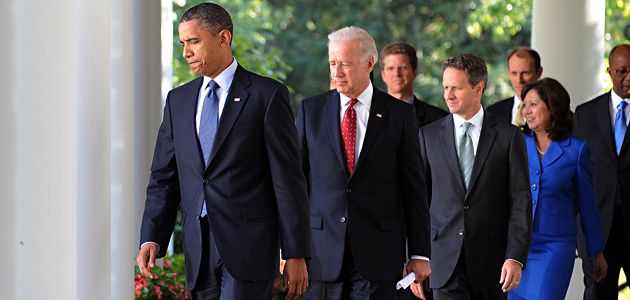
It is a ritual as predictable as the tides. With every election, we descend into soundbite economics. Rhetorical claims grow more partisan and self-serving. We are now deep in this process. President Obama's policies either averted another Great Depression—or have crippled the recovery. These debates confirm the dreary state of economic discourse. The right rejects the idea that sometimes government must rescue the economy from panic; the left sees salvation only in ever-larger government. The first is an invitation to anarchy; the second threatens long-term economic growth through higher taxes, regulations, or budget deficits.
When Obama took office in early 2009, the economy and financial markets were in virtual free fall. By summer, they were not. Only a rabid partisan can think that Obama's policies had nothing to do with the reversal. His forcefulness helped calm the prevailing hysteria.
True, many recovery policies came from the Federal Reserve, and others—notably the unpopular Troubled Asset Relief Program (TARP)—began under the Bush administration. Obama's contributions included the "stimulus program," a rescue of the auto industry, and a "stress test" for 19 large banks. The "stress test" explored whether banks needed big infusions of capital. Most didn't.

The process was messy, and although many details can be questioned, the overall impact was huge. Without government's aggressive response, gross domestic product would have dropped 12 percent instead of 4 percent, and 16.6 million jobs would have been lost instead of 8.4 million, estimate economists Alan Blinder of Princeton and Mark Zandi of Moody's Analytics. Unemployment would have hit 16 percent. These numbers, too, can be disputed (they seem high to me), but the direction is certainly correct.
Up to a point, blaming Obama for the sluggish recovery is also unfair. Millions of Americans were overborrowed. Paying down debts was bound to crimp the $10 trillion of consumer spending. Could anyone have realistically neutralized that? Nope. The right's sweeping indictment of Obama is wildly exaggerated. However, it's not entirely misplaced.
Confidence is crucial to stimulating consumer spending and business investment, and Obama constantly subverts confidence. In the past year, he's undone some of the good of his first months. He loves to pick fights with Wall Street bankers, oil companies, multinational firms, health insurers, and others. He thinks that he can separate policies that claim to promote recovery from those that appeal to his liberal base, even when the partisan policies raise business costs, stymie job creation, or augment uncertainty—and, thereby, undermine recovery. His health-care "reform" makes hiring more expensive to employers by mandating insurance coverage; the moratorium on deepwater drilling kills jobs. No matter.
Obama's proposal to increase taxes on personal incomes exceeding $250,000 ($200,000 for singles) is the latest example of his delusional approach. It satisfies the liberal itch to "get the rich." Well, the rich and most other taxpayers will ultimately have to pay higher taxes to help close budget deficits. But not now. Raising taxes in a weak economy doesn't make sense. Just consider: these affluent households represent almost a quarter of all consumer spending, says Zandi. Richard Curtin, director of the University of Michigan's Survey of Consumers, says his data suggest that uncertainty about the extension of the Bush tax cuts has already caused affluent buyers to cut their spending.
Some small businesses would also be affected, because many (sole proprietorships, partnerships, and subchapter S corporations) file their taxes on personal returns. Higher taxes would discourage hiring and expansion. No one knows by how much, but the Tax Policy Center estimates that higher business taxes would affect 725,000 returns with about $400 billion of business income. Some of these are partnerships of doctors, lawyers, and accountants. Others are contractors, restaurant owners, florists, and plumbers.
All the partisan rhetoric can be ascribed to "politics as usual." True. That's the point. In an election dominated by the economy, the campaign discourse is strangely disconnected from underlying economic realities. The simplicities of the right collide with the simplicities of the left. Americans face crucial economic choices. How to cut long-term budget deficits without threatening the present recovery? How big should government grow, and how best to pay for it? How to control health spending without damaging health care? On these and other hard questions, the silence is deafening.
Robert Samuelson is also the author of The Great Inflation and Its Aftermath: The Past and Future of American Affluence and Untruth: Why the Conventional Wisdom Is (Almost Always) Wrong.
Uncommon Knowledge
Newsweek is committed to challenging conventional wisdom and finding connections in the search for common ground.
Newsweek is committed to challenging conventional wisdom and finding connections in the search for common ground.
About the writer
To read how Newsweek uses AI as a newsroom tool, Click here.








